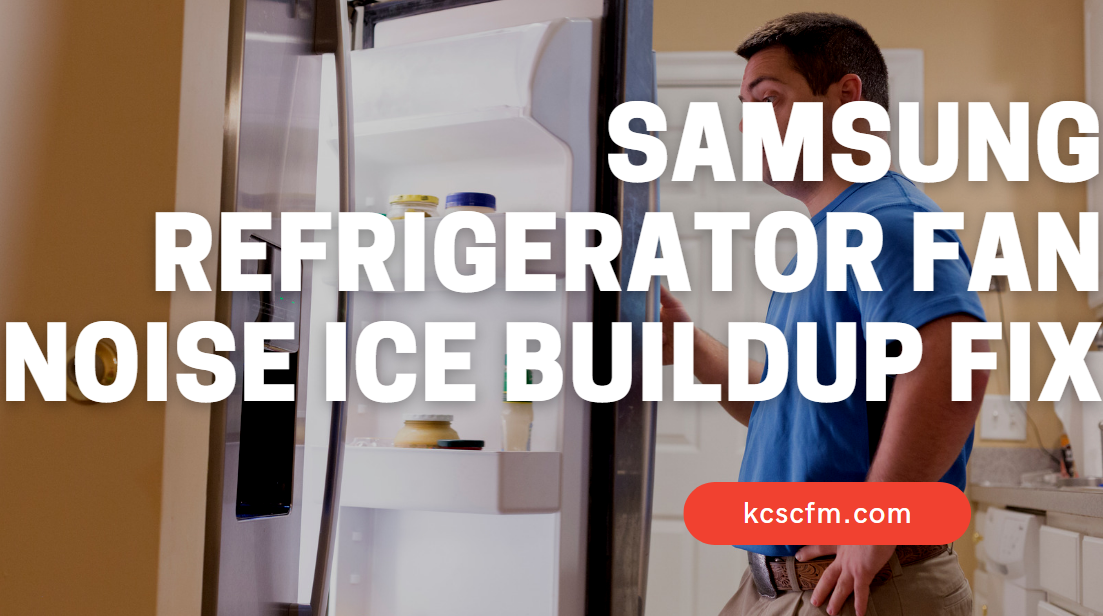Can you hear the refrigerator fan running? It might be the ice buildup in the freezer or refrigerator. You can fix this yourself.
If you own a Samsung refrigerator, you may have noticed that it makes a loud humming sound when the ice is making. This noise is from a fan in the refrigerator that runs 24/7 to circulate cold air throughout the unit.
You’d have thought Samsung’s best refrigerator would last longer than a couple of years. That was not the case for you, however. Your refrigerator started making an obnoxious noise and icing up at odd hours of the day — sometimes even when it wasn’t on! You’ve noticed that your frozen products are hiding beneath a thick layer of ice, so you’re certain that it’s not because of a freezer malfunction.
The area near the fan within your Samsung refrigerator has iced up, causing an obnoxious noise during normal operation.
This can cause the refrigerator to make a loud noise. If you notice that your Samsung refrigerator is making an unusual noise, check to see if frost buildup has collected in the freezer or refrigerator fan/condenser. The condenser is either directly behind or next to the fan. The condenser may have frost buildup around it.
Ice buildup can be a hellish problem in Samsung refrigerators — the constant clinking and clanking is annoying, and it can interfere with the fan’s ability to properly push air throughout the refrigerator. On top of that, you might find that the buildup prevents your fridge from keeping food cool like it should.
Make sure to follow these tips exactly if you want to get rid of an ice buildup on your Samsung refrigerator and prevent future build-ups.
Samsung Refrigerator Fan Noise Ice Buildup Fix – Troubleshoot And Diagnosis

There are several ways you can prevent ice buildup and stop your fridge from kicking up a fuss with that loud fan.
To fix your noisy refrigerator, simply run an hour or two of a mechanical defrost cycle (typically the “rD” setting on older units and the “Manual” setting on newer ones). This will prompt a sequence of warm-to-cool cycles that melts accumulated ice and frost away from the evaporator coils.
Let’s see the solution to fix the noise problem.
1. Do A Manual Defrost
If you are hearing a noise from Samsung’s refrigerator, it is likely caused by ice buildup.
To fix this, first unplug the appliance then remove all food and containers stored in the door compartment. Remove the shelves and place them on a flat surface. Take out all removable parts, such as crisper, meat tray, and left door bin.
One of the easiest ways to prevent ice from forming in your fridge is to simply wipe up any water spillage. That may sound like a no-brainer, but you’d be surprised at how many people don’t follow that simple rule.
You may also want to consider keeping a small bowl by the sink or on your countertop specifically for catching water as you wash dishes.
Plug in a hair dryer (or use a hand-held steamer) and turn it on to low. Prop the dryer up into the opening of the freezer and direct the airflow toward the ice. The frozen chunks will quickly melt away, so you can access your food again.
Clear out all of the ice buildup on your machine, and then let it air dry. Once it is thoroughly dried, reinstall the panel in reverse order.
NOTE: If you need to remove the panel, be gentle and don’t pull or pry on it too hard — you could break it.
Check Here for a Solution on Samsung Forced Defrost Beeping
2. Unplug The Refrigerator for 24-48 Hours
Fridges often make too much noise, especially when the cooling fans are struggling to keep up with the load. This may be caused by an ice buildup in the cooling system that’s preventing proper airflow.
To solve this problem, unplugging your fridge overnight or for full 2 days and letting it defrost will allow the cooling fan to operate properly and quietly once again.
When you disconnect your refrigerator from power, it cuts off the power supply and stops all operations, which includes the cooling fans. You could also use this trick to defrost your refrigerator or freezer.
3. Check Drain Hole
Fridge fans are notoriously noisy, and Samsung is no stranger to this problem. When you’re trying to watch a movie or keep an infant asleep, loud fans will ruin any experience. Thankfully, there’s a relatively easy solution to this annoying problem.
The root cause of the problem is ice buildup. When ice builds up at the back of the refrigerator, its weight causes the air vents to bend and restricts airflow. Clogged vents cause the Samsung refrigerator Fan to work harder in order to push cool air into your refrigerator — which makes it louder. To prevent this problem from happening again, you can de-ice your unit by defrosting the back of it regularly.
You can fix the Samsung refrigerator noise problem by wrapping a few turns of copper wire around the back heater, as explained above. If you’re still facing insulation problems, note that some customers have reported receiving excellent results from padding the inside of their freezer with a layer of bubble wrap or similar material.
If you’re experiencing this problem, it may be worth your while to experiment with this step and see how it affects the performance of your refrigerator.
If your Samsung refrigerator is making a loud fan noise, there is a simple fix. Just get a 6 inch long copper wire, wrap it around the heater tube (above the drain hole), and extend it into the drain hole.
Make several turns (3 or more) as you go down into the drain hole. This will help carry the heat from the back heat pipe down into the drain hole and prevent ice from building up inside.
Helpful Note: If you don’t have the right size wire for this project, you can use two smaller gauge wires. Wrap them around the left and right side of the Samsung refrigerator heater pipe, and extend them down into the drain hole. You’ll want to place them about 1.5-2 inches down.
4. Move The Refrigerator Bit forward
Samsung refrigerator fan not working properly? It’s definitely not normal behavior — however, there are several reasons why your Samsung refrigerator may be malfunctioning.
The cause might be a refrigerator coil blockage or an insufficient ventilation system in your kitchen.
You may want to look into fixing a Samsung refrigerator fan. If the fan is not operating properly, the air will not circulate to the areas that it’s supposed to which means your produce will spoil faster. The proper function of the fan also prevents excess humidity in the fridge from building up.
If your Samsung refrigerator is making a loud, unusual noise, it might need to be repaired. Samsung recommends moving the fridge forward about 2 inches to make more room for it — this can sometimes solve the issue on its own. If that works, it means another object (like a water line or the wall) has come into contact with the fridge and needs to be moved.
5. Faulty Evaporator Fan
Built into the evaporator coils of your Samsung refrigerator is a powerful evaporator fan motor that’s responsible for drawing cold air into the fridge. This fan motor draws in cool air from underneath the fridge and distributes it inside.
The evaporator fan motor on your Samsung refrigerator, which appears to be coming from the freezer area, could be causing a loud noise—and possibly damage to the unit.
Loud noise coming out of a Samsung refrigerator could mean a few things. It could be an issue with the pump or water filter, or perhaps the evaporator fan motor required service.
If you start to notice that your fridge isn’t keeping its temperature as cold, or that ice is taking longer to freeze, it could be a problem with the evaporator fan motor. This part can cause excessive noise during system operation.
The clicking or grinding noises from your fridge are likely the result of a failed evaporator fan motor bearing. When the motor bearings wear out and become loose, the fan slows down, which causes noise. The bad bearing also means that it could be burning out and not spinning at all, which can cause a buildup of frost in the freezer.
Overall, the bearings can often cause more noise than the actual motor.
In order to prevent such problems, fans must be cleaned regularly, and are often lubricated by the owner. It is important to be careful when lubricating fans, as the lubricant must not get into the motor or its bearings, as this will cause damage.
6. Damaged Fan Blade
Fridge fans can be a confusing part of current refrigeration technology. Because of this, it’s important to know that all refrigerators need at least two fans: a condenser fan and an evaporator fan, each with distinct functions. The condenser fan draws in cooler, outside air and pushes it across the condenser coils.
Your refrigerator needs two fan blades to function well. One of the fans is on the condenser motor and helps circulate air past the condenser coils. This helps remove heat generated by the refrigerant gas turning into a hot liquid. The other fan is on the evaporator motor.
At the heart of every refrigerator, a device called a compressor compresses a refrigerant and sends it through coils that are in the cold compartment and the warm compartment. The gas travels across these coils, which are colder than the gas itself. This creates a temperature difference, causing heat to transfer from the warm side to the cold side, until the refrigerant – now a gas – is cooled.
The evaporator coil has a lower temperature than the freezer, so the refrigerant in the liquid state is expanded into a gas. As it passes through the evaporator coil, it gives up some of its heat to the air and condenses back into a liquid. The liquid refrigerant then goes back to the compressor where it is compressed back into a gas and sent through the reversing valve again, repeating the cycle.
One of the most common refrigerator noises is a squeal coming from the fan area. Often this is caused by worn cooling fan blades. This problem tends to be more common in refrigerators over ten years old, but can happen at any age when there isn’t enough airflow in your refrigerator.
A damaged condenser fan blade will cause the fan to rub against a baffle or panel, resulting in the squealing you may hear when the unit is turned on or off.
Final Thoughts
Even if you have a new Samsung refrigerator, ice buildup and fan noise can still occur. You may want to use the defrost feature more regularly or clean the evaporator coils regularly.
Here are some tips for making sure your refrigerator is operating optimally:
Use the defrost feature once a month or more frequently for preventative maintenance.
Clean the coils regularly.

Hi there! I’m Sam Hendricks, and I’m a repair technician and expert. I created this website to help people like you save money and time by fixing your own appliances.
Over the years, I’ve seen people spend a lot of money on unnecessary repairs or replacements. That’s why I decided to share my expertise and create easy-to-follow guides for fixing appliances on your own.
